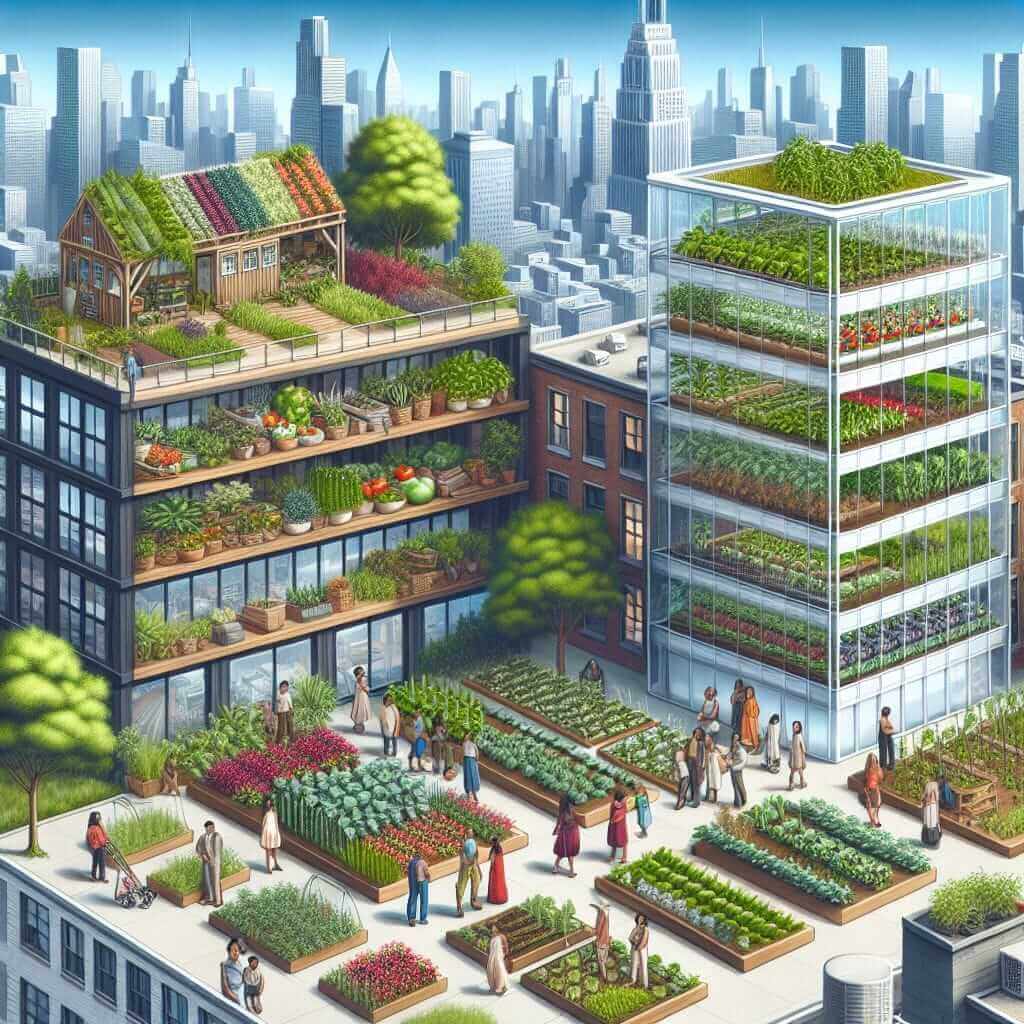The Reading section of the IELTS exam poses a significant challenge with its variety of questions and the need for quick comprehension. Urban farming and food security is a topical issue that has garnered substantial attention in recent years. With the rapid acceleration of urbanization, there is growing interest in how urban farming can contribute to food security. To help you prepare for the IELTS Reading test, we will delve into these concepts. Past trends have shown that themes around environmental sustainability and food security frequently appear in IELTS exams, suggesting this topic might surface in future tests.
Reading Practice Test: Urban Farming and Food Security
Passage
Urban farming involves growing food within city environments. This practice has surged in popularity due to its potential to address food insecurity, which refers to the unavailability or inaccessibility of food. As cities expand, urban farming presents a sustainable solution for producing local, fresh produce. This article explores urban farming practices, their benefits, and challenges, with a focus on their impact on food security.
Urban farming encompasses various methods, including rooftop gardens, vertical farming, and community plots. Rooftop gardens utilize otherwise neglected spaces and can significantly reduce the urban heat island effect. Vertical farming, using vertically stacked layers, maximizes space efficiency and controls the growing environment, leading to better crop yields. Community gardens promote social interaction and education about healthy eating.

One of the key benefits of urban farming is its capacity to enhance food security. By producing food locally, urban farms reduce the dependency on long supply chains, which can be disrupted by natural disasters or economic downturns. Fresh produce grown locally is also typically more nutritious, supporting public health. Moreover, urban farms can provide employment opportunities and foster a sense of community pride.
However, challenges to urban farming remain. Limited space in densely populated cities can restrict the scale of farming projects. Concerns about soil quality and pollution also pose risks to food safety. Additionally, urban farming requires significant investment in infrastructure and technology, which may not be feasible for all cities.
In conclusion, while urban farming holds promise for improving food security, it is not without its hurdles. Addressing these challenges through thoughtful planning and investment is crucial for realizing its full potential.
Questions
Multiple Choice
-
What is one advantage of rooftop gardens mentioned in the passage?
a) They reduce the urban heat island effect.
b) They are inexpensive to establish.
c) They do not require any maintenance.
d) They can produce crops year-round without sunlight. -
Which of the following is a challenge associated with urban farming?
a) Overproduction of crops.
b) High dependency on traditional supply chains.
c) Concerns about soil quality and pollution.
d) Lack of community interest.
True/False/Not Given
- Vertical farming can lead to better crop yields.
- Urban farming always provides immediate economic benefits.
- Community gardens can promote social interaction and education.
Matching Headings
Match each paragraph with the correct heading:
-
Paragraph 1:
- i) The Rise of Urban Farming
- ii) Challenges in Urban Farming
- iii) Types of Urban Farming Methods
-
Paragraph 2:
- i) Community and Vertical Farming
- ii) Economic Impact of Urban Farms
- iii) Efficiency of Urban Farming
-
Paragraph 3:
- i) Benefits of Urban Farming for Food Security
- ii) Urban Farming Infrastructure
- iii) Disadvantages of Urban Farms
Sentence Completion
- Fresh produce grown locally is typically more ____ than that transported over long distances.
Summary Completion
Complete the summary using the words from the passage.
Urban farming methods such as ____ and ____ help utilize space efficiently and reduce the ____ effect. They also promote healthy ____ and provide community ____. However, the challenges of soil ____ and the need for significant ____ remain obstacles that must be addressed.
Answer Key
- a) They reduce the urban heat island effect.
- c) Concerns about soil quality and pollution.
- True.
- Not Given.
- True.
- i) The Rise of Urban Farming.
- i) Community and Vertical Farming.
- i) Benefits of Urban Farming for Food Security.
- nutritious.
Vocabulary
- Urban farming (n): /ˈɜːrbən ˈfɑːrmɪŋ/ – The practice of cultivating, processing, and distributing food in or around urban areas.
- Food security (n): /fuːd səˈkjʊərɪti/ – The state of having reliable access to a sufficient quantity of affordable and nutritious food.
- Vertical farming (n): /ˈvɜːrtɪkəl ˈfɑːrmɪŋ/ – A method of growing crops in vertically stacked layers, often incorporating controlled-environment agriculture.
- Rooftop garden (n): /ˈruːftɒp ˈɡɑːrdən/ – A garden on the roof of a building.
- Urban heat island effect (n): /ˈɜːrbən hiːt ˈaɪlənd ɪˈfɛkt/ – An urban area that is significantly warmer than its surrounding rural areas due to human activities.
Grammar
Passive Voice
- Structure: Subject + form of “to be” + past participle (V3)
- Example: Fresh produce grown locally is typically more nutritious. (Passive: grown locally)
Relative Clauses
- Purpose: Adding extra information about a noun without starting a new sentence.
- Example: Urban farming, which involves growing food within city environments, has surged in popularity. (Relative clause: which involves growing food within city environments)
Advice
To improve your IELTS Reading score, it’s crucial to practice with a variety of texts and question types. Focus on expanding your vocabulary and understanding the passage structure. Time management is also vital; practice reading quickly while retaining comprehension. Incorporate diverse topics, including emerging issues like urban farming and food security, to prepare for different types of passages.
For more valuable insights into related topics, you can explore our articles on The Impact of Urban Agriculture on Food Security and How Can We Encourage More Sustainable Farming Practices?.